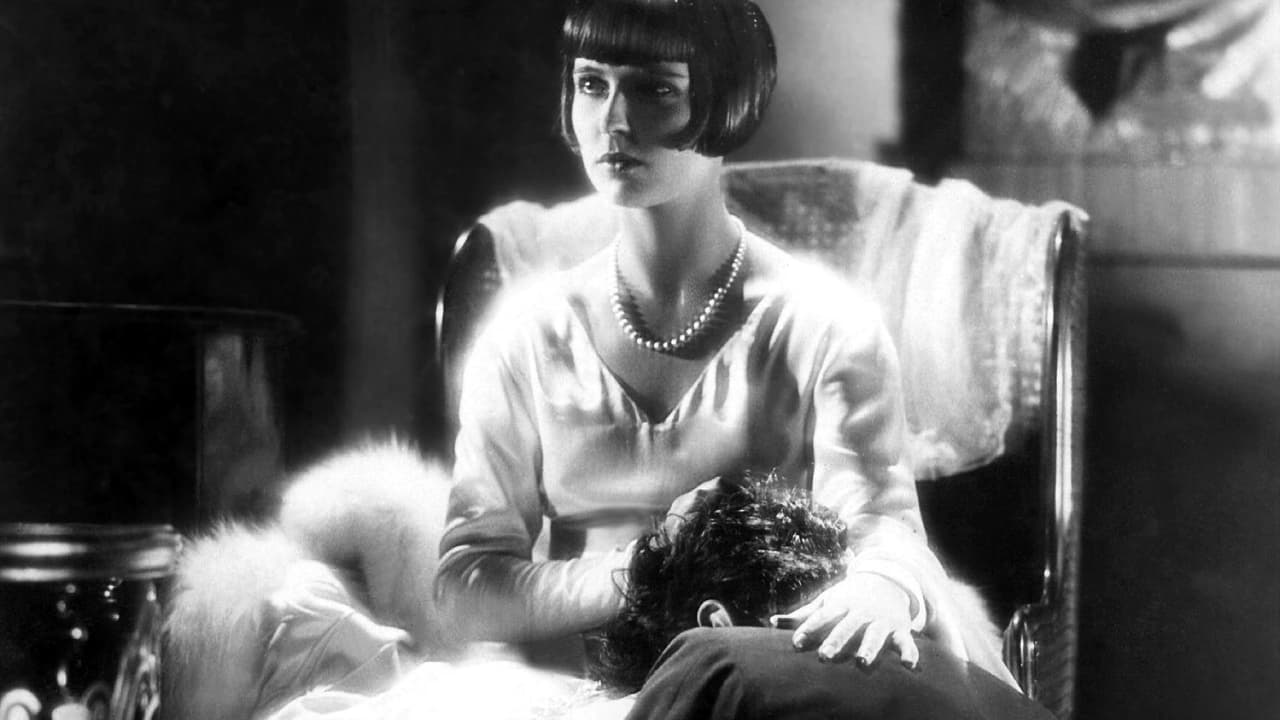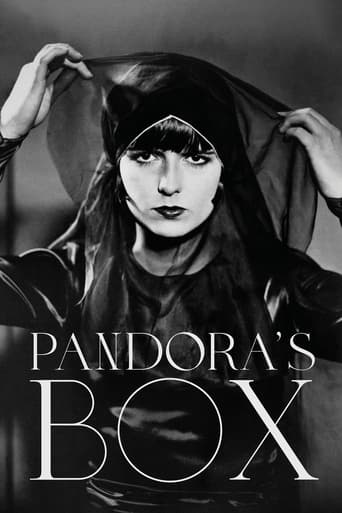

Even in Louise Brooks own autobiography it is hard to tell where the character of Lulu ends and Miss Brooks begins. The picture of modern femininity in the late 1920s with her "flapper" pageboy haircut and sexuality. She stood against convention and paid the price for her modernity within the Hollywood structure. So, too, Lulu who makes her way through Pandora's Box as a modern woman who uses her sexuality to make a place for herself while ignoring the possible consequences of her actions. Does she care about these consequences--no--Lulu lives for the moment and even when it is time to pay the ripper at the end, she is unaware of the price she must pay. Certainly, as a film, it is the zenith of Pabst's work. Filmed during the end of the German Weimar era it begins to show the fraying of the moral liberality that would lead so many Germans to the acceptance of a Hitler Germany. Nevertheless, it a beautiful film where the image is the storyteller. The soft lighting on Lulu's face so captures the uniqueness of Louise Brooks beauty which is so unmarked by lines that it appears as a caricature rather that a living, breathing person. That is what Lulu is and that is perhaps why Miss Brooks was the perfect casting for this project and why she is so imagined as the character herself. For me, the final scene, as the Salvation Army marches off under the archway is the most spectacular. The lighting detail with rays of light extending from a window contrasted by the perfect amount of fog gives me goose flesh.
... View MoreOne person's classic film experience is another's cautionary tale, and even more so when it comes to George W. Pabst's silent film masterpiece and morality conundrum, Pandora's Box. For over eight decades, film reviewers have written reams about the sordid tale of sad wanton Lulu, living her life of hedonism, which spirals towards its inevitable tragic end. What is remarkable about this 1929 German classic is that it not only stars American film bad girl Louise Brooks, but that its anti-Semitic innuendos have been ignored by audiences and film critics alike.Fired from Paramount over a salary feud, Louise Brooks, of bobbed-hair fame, turned up her nose at the studio giant and went off to Germany and cinematic immortality. There's artistry in every movement of Ms. Brook's Lulu and she appears in almost every scene of this 133 minute restored film. It's difficult to portray a successful prostitute, murderer, and bisexual playgirl--- and make the audience love you in the process – especially in the 1930s! It was customary during the 1920s to cast the flapper as a fallen woman, partly as a warning to women who were already straining at the bit to define their own empowerment amid the changing times. By the ending credits, our flapper would either give up her wild ways, the man she loved, or die. One reason Pandora's Box still holds up today is because she brings a modern effortless style to her Lulu, when such authenticity was absent from most silent films. It's a testimony to this finely-tuned skill, that Louise Brooks is still able to command our attention almost a century later.Another factor is the brilliant cinematography of Gunther Krampf, who bathes Lulu in warm seductive whites during the first half of the story. As Lulu's world begins to unravel, he envelopes her in increasingly somber hues of gray and finally, black.The plot is your standard fallen-girl-with-a-heart-of-gold, who uses everyone and then gets abused as her fortunes turn sour until the bitter end. It's painful to watch Lulu as she vainly flits from one selfish person to another in her aimless search for self-destruction. We find ourselves hoping, right along with Lulu, that people will inherently be as good as they pretend - or delude - themselves into thinking that they really are. Her decision not to charge her pick-up - the man who delivers her death - is the final tragic irony, and as the candle flickers weakly, we wonder if she, too, understood it.Pandora's Box comes from an ancient Greek tale of the goddess Pandora, whose curiosity opened a box of evil upon the world. German dramatist, Frank Wedekind, wrote two short plays, Earth Spirit and Pandora's Box, that were known as the "Lulu plays", and were usually produced as one set piece. Lulu's world boils down to the narrow confines of her lifestyle choices, which are dependent on men's generosity and their predictable consequences. Wedekind saw Lulu as a free spirit falling victim to the selfish nature of Man, something that pleased the German Expressionists but failed to impress the censors on both sides of the Atlantic.Pandora's Box begins in Lulu's apartment, where two elements emerge: The first is the camera's eye, moving over Lulu's living room, quickly sweeping past a menorah sitting on a table. Such a bold reference marks Lulu as Jewish, and that knowledge is paired with the appearance of Schigolch (Carl Goetz), Lulu's former pimp – who she treats as a surrogate father, "Papa Brommer". Schigolch is the evil that returns to wreck havoc on Lulu, and his facial features suggests that he is semitic. Pabst spares no small effort to make Schigolch appear amoral, greedy, and dirty; someone who is content to wallow in his own filth and brazenly takes money from Lulu's purse as she watches – but does nothing. During the pre-war period, such anti-semitic precepts were beginning to find their way into the common forms of enculturation – the universities, mass media, and the creative arts – and would become fully realized by the mid 1930s. In these few moments then, Lulu becomes realized as a female version of the Golem – a moronic monster from a 1920 movie of the same name – who creates havoc with her frenzied sexuality upon the helpless male (Christian) population. Such subtle distortion might suggest that Pabst's interpretative tale of woe goes far beyond playwright Frank Wedekind's reflective Lulu stories.If one can attribute an auteur approach from Austrian director George Pabst – what exactly was he trying to say? Was he a racist, warning the German world of the evils of the Jewish people? Or was he a spectator on the world's stage, telling us that things – and people - were not what they might seem? Knowing that Pabst himself came back to Germany to make films for the Third Reich only serves to confirm that Pandora's Box was his own "message" film with a few strings attached. When Lulu dies at the hands of a serial killer, tired and only too willing to perish, the question arises whether Pabst was also – on an unconscious level - attempting to warn Jewish audiences about the dangers of passivity. No other semitic references are made in Pandora's Box, and it's puzzling how many viewers have failed – on a conscious level – to pick up on these subtle puzzle-pieces that make up this notable film. Maybe this also is a testimony to the talents of Ms. Brooks and the skills of G. W. Pabst. Yet film critics have ignored these aspects, too, perhaps because to address them means negating a film that is considered a cinematic milestone, much like D.W. Griffith's Birth of a Nation. To truly open G. W. Pabst's Pandora's Box means we might just discover another classy piece of propaganda from a closeted anti-semitic artiste.Note: Visit OutsideHollywoodland.com to view complete review.
... View MoreLouise Brooks, eh? What a woman. She illuminates the screen in this lurid cautionary tale about the dangers of having a good time, to the point where any other actor sharing the screen is simply forgotten by the audience. Strange that she ended up working in a department store This film is typical – albeit a superior example - of silent movie story-telling. The visuals take precedence over the dialogue, meaning frequent long sequences during which director G. W. Pabst carefully builds up the atmosphere or simply invites us to dwell, like the male characters in the film, on Ms. Brooks' luminous beauty. It means many people today will find the slow pace difficult to handle, even though the plot reads like something out of a cheap pulp novel. Here we have murder, avarice, greed, infidelity, slave-trading, serial killers, gambling addiction, incipient alcoholism, unrequited lesbian love and blackmail – a potently torrid mix by anyone's standards, but it all seems a little dull.
... View MoreHere is a film that I had never seen until recently. "Pandora's Box" stars the legendary Louise Brooks as the ultimate Femme Fatale. She is gorgeous and a splendid actress. This film was based on two plays that were performed at the beginning of the twentieth century. Having read a book about Miss Brooks, it was astonishing to discover what a normal, yet intelligent woman she was. She gave up her budding stardom after a disagreement with Paramount Pictures effectively blacklisted her, banishing her to ever more trivial roles, ending with a 1938 Republic western co-starring Johyn Wayne. That aside, there is much to admire in "Pandora's Box". The DVD comes with your choice of several music scores, and the film transfer is excellent. Do not miss "Pandora's Box."
... View More